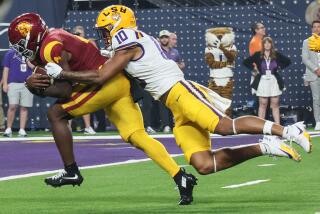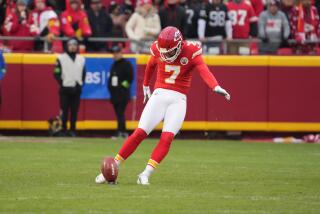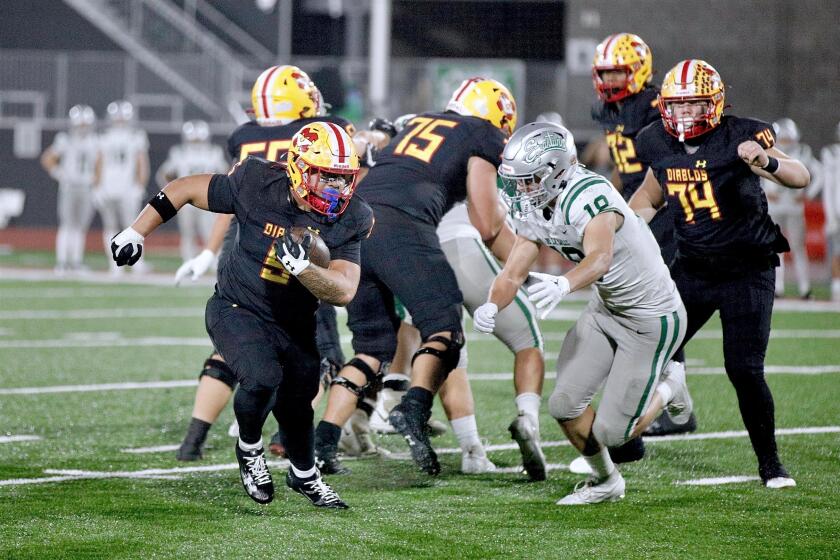Pro Football : The Trouble With ESPN: Many Viewers Cannot Get Cable TV
National Football League owners appear to have taken a drop in class this year, and greed seems to have won out over good sense in their television programming.
The owners have agreed to put nationally televised Sunday night games on stations that can be reached by only about half of the country’s television households.
There are still a lot of people who don’t get ESPN, a cable network.
Cable television is adequate for rodeos, wrestling and anything else appealing to a fraction of the American public. But the Chicago Bears seem demeaned on cable TV.
The point isn’t that everyone in America is entitled to see every nationally televised NFL game. The point is that, previously, the NFL had enough class to offer these games to everyone.
This year, it is deliberately cutting its Sunday night market in half, as it did this week, when parts of Los Angeles and a lot of other places didn’t see Dan Marino and the Miami Dolphins play the Bears.
The established networks have paid millions for the right to show their share of NFL games. ESPN, to get its foot in the door, is paying additional millions.
For games involving local teams, the league will require ESPN to use local over-the-air stations as well. The NFL, however, didn’t get where it is by catering to locals. It has usually made big league decisions.
At least the league is heeding its fans when the subject is instant-replay officiating.
The NFL’s owners would have given up on replays this year. But most pro football viewers--as counted in polls, talk shows and letters to newspapers--favor the idea.
So the NFL has improved the machinery and plans to do better than it did in 1986, when it experienced some problems.
“We’re using 12-inch instead of 8-inch monitors this year,” said Art McNally, the NFL’s supervisor of officials. “And we’ve got two high-speed VCRs at each game. We won’t be waiting on the networks (to show replays).”
McNally said that most decisions will be made in 1 1/2 to 2 minutes, which is as long as any crowd should have to wait. And in their first test last Sunday, on ABC’s Giant-Patriot telecast, NFL specialists got results that fast on all three tries.
The most important reversal gave former UCLA quarterback Tom Ramsey the 27 yards he had earned on a rollout pass for New England on third and 28.
On the field, the officials said that Ramsey had crossed the scrimmage line before throwing. The replay cameras showed that he hadn’t.
In the regular season, an incorrect call of that magnitude could unfairly determine a division title.
Brian Bosworth, the Oklahoma linebacker, has won his fight to play pro football in a winning environment.
“I didn’t have anything against your town,” he told Seattle writers after the Seahawks signed him. “Other (towns) may hate my guts now, but I thrive on that.”
Bosworth had skipped the regular draft and waited for a supplemental draft to avoid certain cities.
That enraged many sports fans and football people, who said that the young man’s selfishness defeated the purpose of the draft.
Still, he was merely exercising a right that most U.S. sports fans have--freedom to live and work where they choose.
Chuck Knox of the Seahawks seems to have made a greater improvement in linebackers than any NFL coach in many years.
“Last season, Chuck only had one all-pro linebacker,” said Buffalo scout Norm Pollom, identifying Fredd Young. “This season, he’ll have four.”
The others are Tony Woods of Pitt, Seattle’s No. 1 choice last spring and the 18th player drafted; Dave Wyman of Stanford, No. 2, the 45th drafted, and Bosworth, whom Knox won in the summer draft.
“Wyman would have been a first-round choice if he hadn’t been injured,” said Dick Steinberg, a New England Patriot scout.
The linebacker acquisitions and Seattle’s fast finish last December have made the Seahawks a preseason favorite in both the AFC West and the conference.
Knox’s reaction?
“That’s nonsense,” he said.
Tom Weir in USA Today: “(The NFL gets) Boz and Bo in the same division.
“That means the Seattle-Raiders game of Oct. 25 will have Brian Bosworth playing for a team he said he’d never join against Bo Jackson in a sport he said he’d never play again.”
The New York Jets started 10-1 last fall with quarterback Ken O’Brien. But in his last six appearances, including one in the playoffs, the UC Davis product was 0-6.
Which Ken O’Brien will show up this year?
“The 10-1 O’Brien,” said Daryl Gross, one of Larry Smith’s assistant coaches on the new USC staff.
“After playing with him at Davis, I can assure you that Ken hasn’t been moping around. He’s a focused, competitive, confident guy.”
Gross, who doubles as a graduate student in psychology, was a wide receiver at Davis.
“(O’Brien) and the team were all banged up at the end last year,” Gross said. “When I saw him (at Davis) last month, he was the same old Ken.”
At the height of Miami Dolphin owner Joe Robbie’s financial crisis early this year in Florida, where he was single-handedly building a stadium without public funds, the NFL apparently denied him a helping hand.
Pro Football Weekly, in an article by associate editor Rick Korch, reports this week that the NFL voted down Robbie’s request for a temporary $1.50 ticket surcharge.
Korch quotes Dallas Cowboy President Tex Schramm’s reaction: “We’ve indulged (Robbie) enough.”
Is any NFL kicker worth a four-year contract adding up to $1.5 million?
Tony Franklin, 30, thinks he is, and the Patriots thought so, too, the other day when they agreed to sign him for about that much.
“I’m glad to see a kicker make it,” said Ben Agajanian, the Cowboys’ kicking coach. “Too many of them are getting $60,000.”
That’s low. But to many NFL coaches, Franklin’s figure is high.
The history of kickers is that from time to time, they all hit, they all miss. Moreover, dozens of them are always available.
Agajanian, who runs kicking camps at Cal State Long Beach and Long Beach’s Millikan High School, said: “There are at least a hundred kickers out there today who are good enough to make an NFL team if given a chance.”
It can be predicted that any NFL owner paying a kicker more than the $200,000 average for veteran players will live to regret it.
The Patriots may regret it already.
Franklin walked out of camp in Smithfield, R.I., Tuesday, after refusing to sign a waiver that would have absolved the club of any financial responsibility should he injure either leg before the start of the regular season.
Coach Raymond Berry said he still wanted Franklin, but management said it was concerned about “deficiencies” in his rehabilitation from off-season surgery on both knees.
Rules Dept.: The NFL’s exhibition-season experiment with a different clock hasn’t brought significantly shorter games.
A week before the regular season, the owners will decide whether to use the new rule--winding up a 40-second clock after each play--or revert to the old rule: starting a 30-second clock after the ball is spotted.
The hope was that games would be shortened, but they still are lasting well over three hours.
What’s more, the league’s most imaginative coaches are saying that a 40-second rule cramps their style.
“It’s awful,” said the Washington Redskins’ Joe Gibbs, who used the old clock to get the right plays and substitutes in the game for his intricate one-back offense.
Thus, the new clock is proving surprisingly divisive. Conservatives such as Knox like it, but it’s no help to such as Gibbs and the San Francisco 49ers’ Bill Walsh.
In the first exhibition of the season, Dolphin Coach Don Shula lost his best offensive player, Dan Marino, and best defensive player, linebacker John Offerdahl.
“They say that (Offerdahl) will miss 10 weeks,” Shula said. “That’s a real concern.”
Marino will probably be back for the Sept. 13 regular-season opener at New England, but he won’t have practiced much, and even Marino needs practice.
He has never had a normal training camp. As a rookie in 1983, Marino had to learn pro ball in the glare of the spotlight. In 1984, he broke a finger the week of the first exhibition. In 1985, he was a holdout for 37 days.
Last year, still troubled by an unsigned contract, he was thinking less about football than his first-born child until the week before the league opener, when the boy and his contract arrived at the same time.
If Marino ever has a good training camp, maybe he’ll amount to something.
More to Read
Go beyond the scoreboard
Get the latest on L.A.'s teams in the daily Sports Report newsletter.
You may occasionally receive promotional content from the Los Angeles Times.










